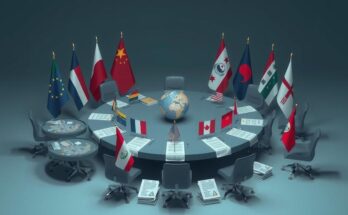The UN Security Council has called for a unified effort to assist the DRC in achieving peace amid ongoing violence, resource exploitation, and humanitarian crises. Bintou Keita from MONUSCO stressed the necessity of collaborative dialogue between the DRC and Rwanda to resolve conflicts while noting the adverse impact of resource competition fueling armed groups. The threat from groups such as the ADF remains, exacerbating humanitarian challenges with millions displaced. Continued international mobilization is essential for supporting peace initiatives and protecting civilians.
The United Nations Security Council convened on Monday to emphasize the need for a collaborative international and regional approach to support the Democratic Republic of the Congo (DRC) amidst ongoing violence, resource exploitation, and multiple challenges in the eastern regions. Bintou Keita, the Secretary-General’s Special Representative for the DRC and head of the UN Mission in the country, MONUSCO, stated, “We need to collectively remain engaged in assisting the country on its path to peace and stability.” Although a ceasefire established on July 30 has led to a noticeable decrease in hostilities between various factions, Ms. Keita cautioned that true peace has not yet been realized. She highlighted the necessity of a structured dialogue framework between the DRC and Rwanda, which has been instrumental in mediating the ongoing conflicts. Ms. Keita acknowledged the recent marginal advancements made by the DRC in political and institutional reforms, yet emphasized that significant obstacles persist. Among these challenges is the escalating competition for natural resource control, particularly in Ituri province, where armed groups vie for control over lucrative mining sites. With the rise in semi-mechanized gold mining, armed factions have transformed into serious contenders in the economy, consequently increasing their militaristic capabilities. The M23 group’s consolidation of power in North Kivu has allowed it to dominate coltan production, particularly from the Rubaya region, which significantly contributes to the global tantalum supply, yielding about $300,000 monthly for the group. This unlawful resource trade is perpetuating armed conflict and exacerbating civilian suffering. Ms. Keita warned, “Unless international sanctions are imposed on those benefitting from this criminal trade, peace will remain elusive, and civilians will continue to suffer.” Additionally, the threat posed by the Allied Defense Forces (ADF) in North Kivu and Ituri continues to escalate, as recent months have witnessed a surge in attacks that have exploited security gaps due to the diversion of Congolese armed forces to confront the M23. The humanitarian implications are profound, with approximately 2.4 million individuals displaced, and many residing in overcrowded camps, vulnerable to communicable diseases and violence. Political tensions are on the rise as well, with opposition groups raising alarms over the erosion of political freedoms and increasing instances of arbitrary arrests. Furthermore, incidences of sexual and gender-based violence remain alarmingly high, with over 61,000 victims treated in just the first half of this year. Ms. Keita reiterated the critical need for a unified effort in international and regional mobilization to assist the DRC’s population. She lauded Angola’s mediation as a promising avenue for detente between the DRC and Rwanda, but stressed that sustainable peace requires profound investments in local governance and community development. The UN continues to play an essential role by supporting civilian protection initiatives and collaborating with local organizations to fortify positive gains in the community. As MONUSCO prepares for its phased withdrawal from South Kivu, after having completed its operations there in June, Ms. Keita stated that the mission remains committed to its protective functions to the very end. She affirmed, “MONUSCO is leaving, but until our very last day, we will continue to protect civilians, support meaningful peace initiatives, facilitate the delivery of humanitarian assistance and assist the Congolese State in its stabilization efforts.”
The Democratic Republic of the Congo (DRC) has been plagued by prolonged conflict, particularly in its eastern provinces, where multiple armed groups vie for control over valuable natural resources, including gold and coltan. The ongoing violence has caused extensive humanitarian crises, with millions displaced and civil society severely impacted. The DRC’s peace and stability are critical not only for its citizens but also for regional security, leading to international interest in facilitating dialogue and conflict resolution. Recent initiatives, such as ceasefires and mediating efforts involving neighboring countries, aim to address these challenges but require sustained support from the global community.
The UN Security Council’s deliberations underscore the critical importance of collective action to combat ongoing violence and foster stability in the DRC. The complexities of the conflict, fueled by resource exploitation and political tensions, necessitate a comprehensive and collaborative approach involving national, regional, and international stakeholders. The commitment to support the DRC and implement effective mediation strategies are vital to creating a sustainable peace framework that addresses the underlying issues affecting the region. Without significant international intervention and sanctions against illicit resource trade, lasting peace will remain a significant challenge.
Original Source: news.un.org




